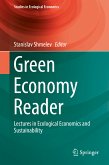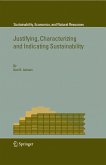The editors of Factor X explore and analyze this trajectory, predicting scarcities of non-renewable materials such as metals, limited availability of ecological capacities and shortages arising from geographic concentrations of materials. They argue that what is needed is a radical change in the ways we use nature's resources to produce goods and services and generate well-being. The goal of saving our ecosystem demands a prompt and decisive reduction of man-induced material flows. Before 2050, they assert, we must achieve a significant decrease in consumption of resources, in the line with the idea of a factor 10 reduction target. EU-wide and country specific targets must be set, and enforced using strict, accurate measurement of consumption of materials. Their arguments are drawn from empirical evidence and observations, as well as theoretical considerations based on economic modeling and on natural science.
Factor X holds that these fundamental principles should underpin future Resources Strategies: the consumption of a resource should not exceed its regeneration and recycling rate or the rate at which all functions can be substituted; the long-term release of substances should not exceed the tolerance limit of environmental media and their capacity for assimilation; hazards and unreasonable risks for humankind and the environment due to anthropogenic influences must be avoided; the time scale of anthropogenic interference with the environment must be in a balanced relation to the response time needed by the environment in order to stabilize itself.
The book concludes by offering proposals and ideas for new national and regional policies on reducing demand and shifting toward sustainability, and concrete actions and instruments for implementing them. The editors have created a useful map on our transformation path towards a "Factor X" society.
Dieser Download kann aus rechtlichen Gründen nur mit Rechnungsadresse in A, B, BG, CY, CZ, D, DK, EW, E, FIN, F, GR, HR, H, IRL, I, LT, L, LR, M, NL, PL, P, R, S, SLO, SK ausgeliefert werden.









